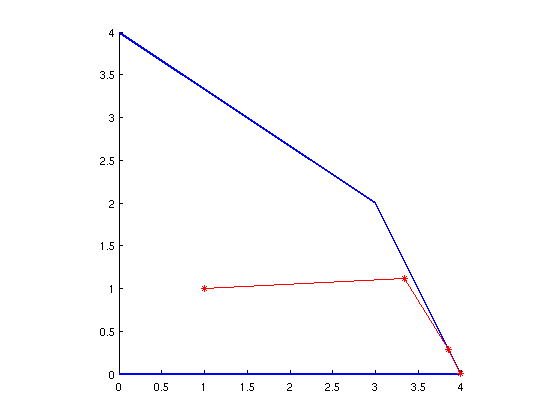p = [-5; -1; 0; 0];
A = [2,3,1,0; 2,1,0,1];
b = [12; 8];
Id = eye(4);
beta = 0.99;
x = [1; 1; 1; 1];
u = [0; 0];
s = [1; 1; 1; 1];
normd = max([norm(A*x-b)/(norm(b)+1), norm(A'*u+s-p)/(norm(p)+1), abs(x'*s/4)]);
k = 0;
fprintf('Starting interior point: \n');
fprintf(' x = [%5.3f, %5.3f, %5.3f, %5.3f]\n\n', x(1), x(2), x(3), x(4));
path = [x(1), x(2)];
while (normd >1e-3)
D = diag(x./s);
invS = diag(1./s);
mu = x'*s/4/(k+1);
ra = -A*x+b;
rb = -A'*u-s+p;
rc = -x.*s+mu;
du = inv(A*D*A')*(ra + A*D*rb - A*invS*rc);
ds = rb - A'*du;
dx = invS*rc - D*ds;
negx = (dx<0);
ax = min([1, beta*min(-x(negx)./dx(negx))]);
negs = (ds<0);
as = min([1, beta*min(-s(negs)./ds(negs))]);
au = as;
x = x + ax*dx;
s = s + as*ds;
u = u + au*du;
normd = max([norm(A*x-b)/(norm(b)+1), norm(A'*u+s-p)/(norm(p)+1), abs(x'*s/4)]);
path = [path; x(1), x(2)];
k = k+1;
fprintf('After %d iterations:\n', k);
fprintf(' x = [%5.3f, %5.3f, %5.3f, %5.3f]\n\n', x(1), x(2), x(3), x(4));
end
figure(1);
clf;
hold on
plot([0,4,3,0,0], [0,0,2,4,0], '-', 'LineWidth', 2);
plot(path(:,1), path(:,2), '-*r');
hold off;
axis equal;
axis([0 4 0 4]);
Starting interior point:
x = [1.000, 1.000, 1.000, 1.000]
After 1 iterations:
x = [3.343, 1.114, 1.971, 0.200]
After 2 iterations:
x = [3.849, 0.288, 3.438, 0.013]
After 3 iterations:
x = [3.990, 0.003, 4.012, 0.018]
After 4 iterations:
x = [3.995, 0.006, 3.992, 0.003]
After 5 iterations:
x = [3.999, 0.001, 3.998, 0.001]
After 6 iterations:
x = [4.000, 0.000, 4.000, 0.000]

